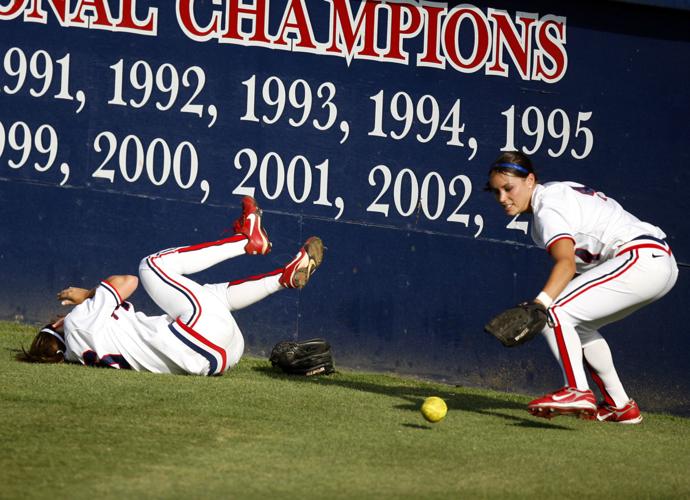Caitlin Lowe was recently named to ESPN’s all-time college softball team along with three other Arizona Wildcats greats: Leah O’Brien-Amico, Jennie Finch and Jenny Dalton.
Lowe, an outfielder for UA from 2004 to 2007, won Women’s College World Series titles in 2006 and 2007 and was named an All-American four times. She has been an assistant coach with the Wildcats since 2012.
Lowe spoke to the Star this week about the ESPN recognition, her aggressive style of play and getting revenge against Texas in the 2006 WCWS. The conversation has been lightly edited for clarity and brevity.
What does it mean to you to be a part of the ESPN list, and were you aware that they were releasing it?
A: “My husband (former UA assistant soccer coach Paul Nagy) called me, that was the funny part. He’s like, ‘I got to go on and vote every day.’ It’s kind of surreal for me because the list of eight outfielders was pretty crazy in its own right. But when I was growing up, my first experience of watching a really good outfielder was (ex-Wildcat) Allie McCutcheon, and she was my idol growing up. And so was Laura Berg. They are kind of who I tried to mimic my game after. So for me to be just on a list with those two was like ‘whoa’. It’s kind of come full circle.”
Do you remember the catch in 2006 in Palm Springs against Texas? There was a portable fence there, and you just ran straight through it and caught the ball.
A: “I remember it very vividly because I was very angry because they ended up calling it a home run and we lost the game by one run. That was the only reason I remember that very much so; we always had a huge battle with Texas throughout my four years with Cat Osterman in the circle. That was a very tough game to lose, but those breakaway fences, you know, I tell our outfielders, especially when we go to Palm Springs, (that) it’s like a gimme; you know, like they don’t hurt. It’s just all about when you catch them. And unfortunately I didn’t catch it in that play. So I think I was more devastated than anything that I couldn’t save that run.”
But you all did get the better of Texas later in the season though, right? In the Women’s College World Series?
A: “Oh, for sure, we won when it counted. I bring that up to Cat all the time. We just went back and forth, and we knew it was like, whoever scored the first run of the game. That was how it was back in the day. You score one and with Alicia (Hollowell) on the mound or Cat on the mound, that was basically it; you had to defend at all costs.”

Arizona’s Adrienne Acton fields the ball after Caitlin Lowe slammed into the wall trying to catch the ball in the Wildcats’ NCAA Super Regional game against Cal State Fullerton in 2007. The UA later installed a warning track.
What about the time you collided with the wall at Hillenbrand Stadium during the Super Regional in 2007? How thankful are you that there are warning tracks now because there were none back then?
A: “There was no warning track. The fence wasn’t padded, it was actually solid wood. So I tell my outfielders all the time (that) I’m the reason that’s all there now. But even with the warning track, it’s so small that usually if you decide to go after a ball, you’re committing to it wholeheartedly. And when something’s that close and it hit my glove, there’s no way you’re just going to watch it hit the fence or fall to the ground. That’s just not how our team operated. We were going to make every play, especially in the postseason. It’s do-or-die time.”
You were a part of a dominant run when you won two World Series as a player. What was it like coming back to the WCWS last summer as a coach?
A: “Yeah, it was fantastic. Every single year I think the environment at the World Series just gets better and better. It was fun to watch them step onto that arena because you’ve reached the pinnacle of college softball and they grow up their entire lives wanting to compete in college.
“So when you get to that final eight, the goosebumps come up all week. You have to take a breath and take it all in, and I think that’s when you really realize that true potential.
“That’s what’s fun when you look at that list, too. Leah O’Brien, she owned that arena. And we have such a history of that at Arizona. So I think it was special for our girls. I think that once you go, it’s easier to go back because you kind of realize what it took to get there.”






